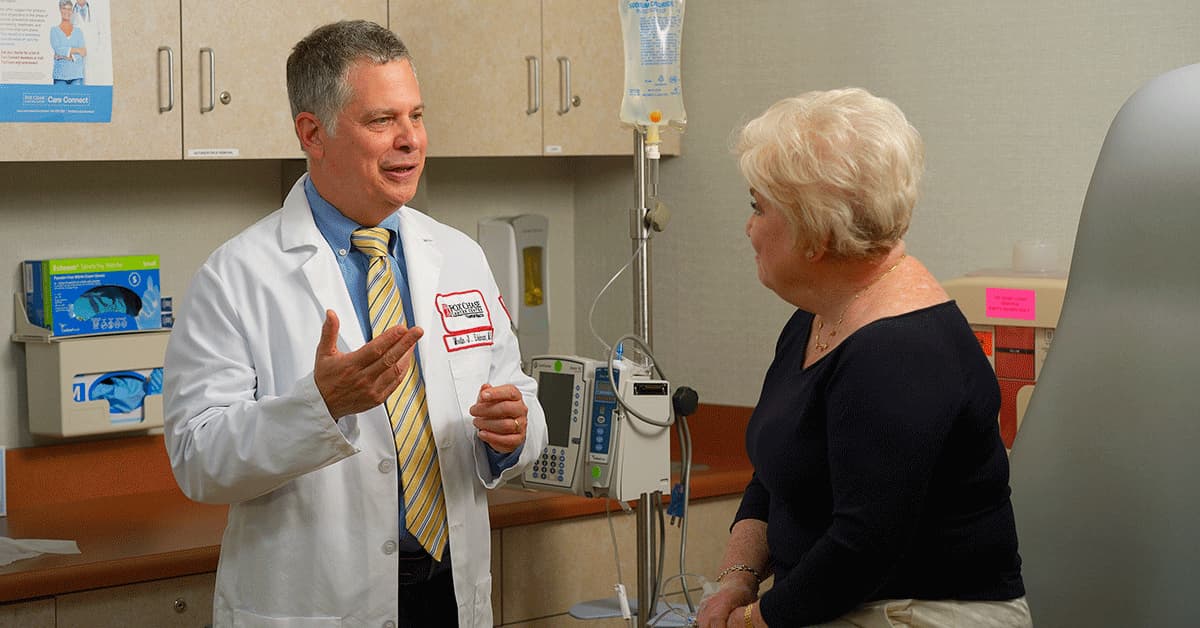
Why a Second Opinion for Lung Cancer Is a Good Idea
-
Updated: February 25, 2020
If you’ve just received a lung cancer diagnosis, you almost certainly feel frightened—and you may have a sense of urgency about starting treatment. But typically there is time for something that could be invaluable: a second opinion.
“That second opinion could make you aware of potentially life-saving treatments you didn’t know existed,” said Martin J. Edelman, MD, chair of the Department of Hematology/Oncology at Fox Chase Cancer Center who specializes in lung cancer. What if the two opinions match? Then you gain something that may be equally worthwhile: peace of mind.
Seeking a second opinion is a common practice following a cancer diagnosis. Some insurance companies even require it. So you shouldn’t feel uncomfortable telling your doctor that you want a second opinion before going ahead with treatment. “It’s an extremely reasonable thing to do when you’re facing a serious diagnosis like lung cancer,” Edelman emphasized. “You’re speaking up for your health.”
Where to turn
Still, not all second opinions are equal. For the best advice, it’s usually wise to consult with a lung cancer specialist—not a general oncologist. In particular, Edelman advises consulting with a specialist at a major academic cancer center. Why? “Because there’s a more complicated set of treatment approaches for lung cancer than ever before,” he said. “Somebody who is an academic specialist is really up on the latest things, such as advances in using the body’s immune system to fight lung cancer.”
Turning to a specialist at an academic center is also likely to give you greater access to clinical trials that test new cancer treatments, Edelman said. That’s especially true if the academic center, like Fox Chase, has been designated as a Comprehensive Cancer Center by the National Cancer Institute (NCI). At any given moment hundreds of clinical trials for all types of cancer are underway at these research centers. Furthermore, recent studies show that patients who begin their treatment at a hospital that specializes in cancer like Fox Chase have a better chance at survival.
Next steps
If you do seek a second opinion, be sure to bring your medical records and any imaging results to your appointment, or have them forwarded ahead of time. Also include your pathology report and, if possible, any slides of tissue samples from your biopsy. That pathology review might actually change your diagnosis, Edelman said, since lung cancer and its stage are sometimes misdiagnosed. It’s also to your advantage to arrive with a family member or close friend who can help you absorb and remember all the information you’ll hear.
One thing to keep in mind is that cancer centers with nurse navigation programs can be extremely valuable when seeking a second opinion. Nurse navigators can help you to prepare for your visit by handling your records transfer, connecting you with the appropriate care teams and ensuring a smooth transition to your first appointment.
Making a decision
If you happen to receive conflicting information and are unsure about whose advice to follow, you might see if it’s possible for both doctors to review your case together. Or you might even consider a third opinion.
But remember this: Just because two doctors differ in their approach to treatment, doesn’t mean one is better. In fact, “often there’s not one right treatment plan,” Edelman said. “So ultimately, it’s important to learn as much as you can about each alternative and then ask yourself, ‘Which makes the most sense for me personally?’”
Doctors can give you their professional opinion on what they consider the best treatment, but in the long run the decision is yours to make.
Looking to get a second opinion at Fox Chase? Request a next business day appointment online or call 888-369-2427
